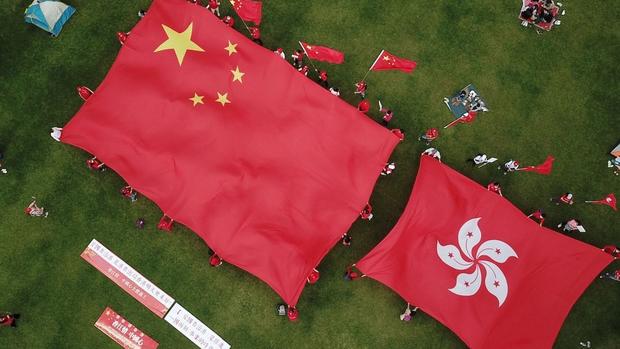Editor’s Note: This year marks the 25th anniversary of Hong Kong’s return to the motherland. Over the past quarter-century, many Hong Kong people have crossed the border to seek new lives on the Chinese mainland. In the second part of China Daily’s “Anniversary Talks” series, we put the spotlight on them to record the dramatic changes on both sides and reveal how closer cross-border connections have left an imprint on their lives.
In this article, Hong Kong entrepreneur Ken Chong Yat-chau, CEO of Guangdong Yikuai Envirotech Company, shares his observations of how favorable polices rolled out by the central government make Hong Kong people’s lives on the mainland easier, and his insights into how he achieved career development by linking his fate with that of the nation’s overall development.
 This undated photo shows Ken Chong Yat-chau, CEO of Guangdong Yikuai Envirotech Company. (PHOTO PROVIDED TO CHINA DAILY)
This undated photo shows Ken Chong Yat-chau, CEO of Guangdong Yikuai Envirotech Company. (PHOTO PROVIDED TO CHINA DAILY)
1. What motivated you to work and live on the Chinese mainland? How has this decision changed your life?
I have been living on the mainland for over 16 years – two years in Guangzhou, seven in Shenzhen and seven in Zhongshan. My reason for settling on the mainland is the spacious living environment, which offers a coveted life for the general public of Hong Kong. With two to three thousand yuan monthly, you can rent a residing place of 100 square meters. A unit of the same size in Hong Kong might cost tens or even hundreds of thousands of Hong Kong dollars a month.
Since 2016, the Chinese central government and the government of the Hong Kong Special Administrative Region have rolled out many favorable policies and more and more Hong Kong people have crossed the border and started businesses in the mainland. I am one of the Hong Kong entrepreneurs that grasped the mainland’s opportunities and enjoy supporting measures brought by “one country, two systems”.
2. Hong Kong people living on the Chinese mainland are significant practitioners of “one country, two systems”. As one of them, would you please share with us how the policy affected your life?
Thanks to the efforts made by the central government and the HKSAR government, the working efficiency of the governments and people’s livelihoods in both places have greatly improved over the past 25 years. As a result, it has become much more convenient for Hong Kong people to live and do business on the mainland.
![]() Mainland-based Hong Kong people can now apply for a residence permit, which allows them to enjoy more public services and facilitation measures on the mainland, such as taking planes and trains with fewer procedures.
Mainland-based Hong Kong people can now apply for a residence permit, which allows them to enjoy more public services and facilitation measures on the mainland, such as taking planes and trains with fewer procedures.
For Hong Kong people who want to do business in the mainland, the registration is much simpler now. The procedures that used to take months and required multiple visits have been replaced by a one-stop service that takes no more than 10 days.
In addition to the improved policies on the mainland, these changes fully reflect the strength of the “one country, two systems” policy in facilitating closer coordination between Hong Kong and the mainland so as to improve people’s livelihoods.
3. What do you think about the development of “one country, two systems” in the past 25 years? Hong Kong has experienced many changes in recent years, such as social unrest, implementation of the National Security Law for Hong Kong, and three elections under the new electoral system. In your opinion, how will these changes affect the city?
The National Security Law for Hong Kong has uncovered that the foreign forces were actually behind the social unrest in 2019 and the advocacy of “Hong Kong independence”.
Those who were paid or brainwashed by foreign forces to destroy the order and prosperity of Hong Kong fell prey to the political conspiracy of the “color revolution”.
The central government’s decisive action to enact the National Security Law and the strict law enforcement of the Hong Kong police prevented the situation from worsening. Otherwise, Hong Kong would be another place hard hit by the “color revolution”.
The implementation of the NSL again proves the flexibility of “one country, two systems” and that “one country, two systems” is viable in the city.
READ MORE: Entrepreneur: HK has much to offer in nation's inno-tech bid
4. There have been many moments of mutual support between the mainland and Hong Kong, including assistance amid the COVID-19 pandemic. What impressed you most? Could you share with us some sweet moments of the integration of the two places you feel in the mainland?
Growing up in Hong Kong, I have seen many charity schemes and donation campaigns for helping people hit by natural disasters in the mainland. Hong Kong people have also contributed to Project Hope, a scheme launched to help mainland children in remote areas complete their elementary education. Many Hong Kong residents chipped in for the program, including my father. Hong Kong people have been supportive and showed their concern for education and children on the mainland.
The past three years, I have been offered a front-row seat to witness the prowess of socialism amid the anti-pandemic efforts. It has been magnificent and neat in dealing with the pandemic. It was especially so when makeshift hospitals were built within days. The mainland also came to the aid of Hong Kong to build makeshift hospitals, completing the arduous tasks within a few days, a task that often take years in other countries and regions. That’s how the country, which has grown stronger, supports Hong Kong under “one country, two systems”.
 This March 6, 2021 aerial photo shows citizens displaying China's national flag and the flag of the Hong Kong Special Administrative Region in support of implementing the principle of "patriots administering Hong Kong" at Tamar Park in Hong Kong. (LI GANG / XINHUA)
This March 6, 2021 aerial photo shows citizens displaying China's national flag and the flag of the Hong Kong Special Administrative Region in support of implementing the principle of "patriots administering Hong Kong" at Tamar Park in Hong Kong. (LI GANG / XINHUA)
5. Could you tell us more about recent developments in your industry, especially under the framework of the Guangdong-Hong Kong-Macao Greater Bay Area blueprint? How has the Hong Kong and mainland people’s understanding of each other changed?
Since the release of the outline development plan for the Guangdong-Hong Kong-Macao Greater Bay Area, I have participated in various online promotions that aim to show more Hong Kong people about real life on the mainland or provide suggestions to those who want to establish businesses in the Bay Area. We have been doing more to introduce the GBA and the life here for the past two years, in the hope of having Hong Kong people ready to come when quarantine-free travel between Hong Kong and the mainland is resumed.
ALSO READ: HK designer eyes closer integration with nation
6. Judging by your experience, how will Hong Kong’s integration into the nation benefit Hong Kong people? In terms of exchanges between Hong Kong and the mainland, what areas have the potential for closer collaboration?
I have fumbled slowly during my years on the mainland. If Hong Kong people want to be successful in their careers or want to take part in the nation’s development, they have to pay attention to the nation’s 14th Five-Year Plan (2021-25). In the plan, it mentions things like “dual circulation” paradigm, artificial intelligence, robots, blockchain, sustainable development and environmentally friendly agriculture. Decoding the policies and aligning your career with that of the nation’s development is your pathway to success.


